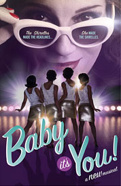Baby It's You! Co-Author Colin Escott on Why Classic Rock Belongs on Broadway
About the author:
Before snagging a Best Book Tony nomination for his very first Broadway show, Million Dollar Quartet, Colin Escott was a respected pop music historian and author of books such as Good Rockin' Tonight: Sun Records & the Birth of Rock & Roll, Hank Williams: The Biography and a history of the Grand Ole Opry. The British-born Escott had settled in Nashville when he and American Hot Wax film director Floyd Mutrux decided to develop stage versions of behind-the-scenes stories from the world of rock music. Now the duo’s second theater piece, Baby It’s You!, is prepping to open at the Broadhurst Theatre on April 27, starring Tony winner Beth Leavel as pioneering record producer Florence Greenberg. Broadway.com asked Escott to write about the origins of his new show and why real-life stories like these are perfect fodder for a Broadway musical.
![]()
After Warner Bros. Theatre Ventures called to say Baby It’s You! was going to Broadway, euphoria gave way to the realization that 10 years had passed since Floyd Mutrux and I started work on the show. Near the bottom of a pile of fading thermal faxes, I found Floyd’s registration of our treatments of Million Dollar Quartet and Baby It’s You! From the beginning, the issue was how to make this music work in drama while keeping it true. Musical biographies had gone on stage. But not this music. Floyd and I wanted to create stage shows that had the anarchic energy of rock ‘n’ roll as we knew and loved it, but above all, we wanted to create shows that lifted the veil on what went on behind the scenes.
I’d worked in the music business since leaving school, and Floyd had worked in film. He’d made a movie, American Hot Wax, about Alan Freed, the legendary deejay offered up by the music industry as its sacrificial lamb during the 1959 payola hearings. The jury’s still out on whether Freed coined the phrase “rock ‘n’ roll,” but he certainly popularized it. And when he drank himself to death in 1965, he became one of the first rock ‘n’ roll casualties. He was probably a crook, but my friends and I revered him, and American Hot Wax has the giddy hormonal rush of the music we love.
Music journalism is mostly about the people who make the music, but I tried to write about the people who make the people who make the music. Back in rock ‘n’ roll’s freewheeling days, no one checked with lawyers, accountants or media coaches. If there was a collective motto, it was “do it and duck.” Many of the old-time record guys were still around when I started in the business 40 years ago. Some of them were down south. Some of them were Broadway guys, but their Broadway was the Brill Building at 1619 Broadway and across the street at 1650 where all the little record companies and publishing companies were squirreled away. And one of the old-time record guys wasn’t a guy at all.
Independently, Floyd and I had bought a box set of CDs called The Scepter Records Story. Scepter was the company that Florence Greenberg took from her kitchen in Passaic, New Jersey, to 1650 Broadway. Starting with the Shirelles, Mrs. Greenberg built Scepter into one of the all-time biggest independent labels. Almost Motown. The soundtrack of my life, or 10 years of it. The box set told the story I already knew of how Mrs. Greenberg hired an African-American A&R man, Luther Dixon. But then one day Floyd phoned to say that he’d found out that Florence Greenberg and Luther Dixon were partners in more ways than one. That’s when the story got really interesting: a Jewish housewife and an African-American musician together in the early 1960s, when black kids didn’t even dance with white kids on American Bandstand.
So now it’s 2011, and most rock ‘n’ roll icons have either passed on or passed their seventieth birthday—but on Broadway, we can bring back their music. It’s not just nostalgia. Today’s music is usually layered track upon track, day upon day. Baby It’s You! captures the era when four songs were recorded in the time it takes to get the microphone placement on the snare drum today. Urgency, fear, sweat. That’s what lay behind most rock ‘n’ roll classics. Broadway understands that. That’s why this music belongs in our hallowed playhouses.
